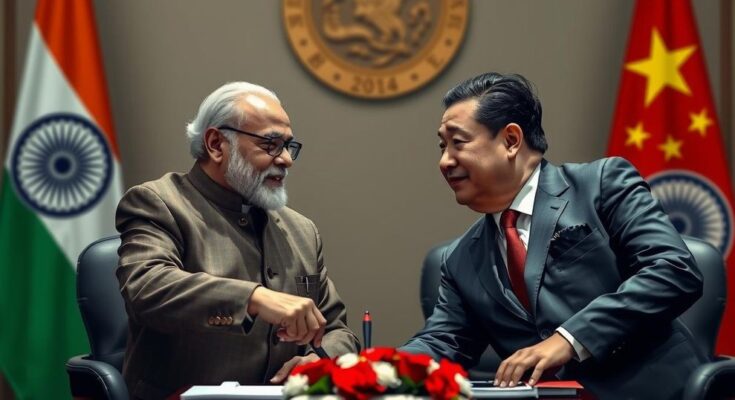During the BRICS summit in Kazan, Russia, Chinese President Xi Jinping and Indian Prime Minister Narendra Modi engaged in their first significant dialogue in five years, centered on an agreement to disengage troops along their contested border. This newfound cooperation may indicate India’s intent to reassess its reliance on U.S. strategies against China, despite uncertainties surrounding territorial claims and broader economic ties. Analysts observe that while the meeting suggests a potential thaw, substantial challenges remain in fully normalizing relations between the two powers.
At the recent BRICS summit in Kazan, Russia, leaders of the world’s most populous nations, Chinese President Xi Jinping and Indian Prime Minister Narendra Modi, met for their first substantive bilateral dialogue in five years, marking a potential turning point in a historically rocky relationship exacerbated by a violent border clash in 2020. This encounter took place against the backdrop of an agreement to disengage troops along the contested border in Ladakh, where tensions had escalated dramatically following a deadly conflict resulting in casualties for both nations. Analysts suggest that this thaw in relations may indicate India’s intention to reassess its alignment with the United States in countering China’s growing influence. “The India-China detente is the most significant geopolitical development in Asia this year,” remarked Zorawar Daulat Singh, emphasizing India’s shift away from exclusive reliance on its U.S. alliance. Although both nations share concerns over China’s assertiveness, the ambiguity surrounding the details of the recent disengagement agreement leaves considerable uncertainty regarding future relations. Political analysts are questioning the conditions under which the agreement was made and whether China’s encroachments along the border have been reversed. Furthermore, economic relations between the two countries remain fraught, particularly following India’s ban on multiple Chinese applications and companies after the 2020 clash. However, experts advocate for renewed economic engagement, highlighting areas where Chinese investment could benefit India’s industries and contribute to its global supply chain integration. In light of dwindling foreign direct investment, Indian policymakers may find merit in rethinking their stance toward Chinese investments to bolster critical sectors like electric vehicles and pharmaceuticals. Despite the recent agreement signaling a desire for normalized relations, the complexities of Indo-China relations suggest that long-term reconciliation will require sustained diplomatic efforts and clarity regarding territorial issues. As nations monitor the implications of this development, the underlying tensions and strategic concerns between India and China will likely persist, complicating any immediate resolution.
The relationship between China and India has been historically challenging, particularly heightened by territorial disputes and military clashes, notably the significant conflict in 2020 that resulted in the death of soldiers from both nations. Subsequent to these events, India increasingly aligned itself with Western nations, particularly the United States, in counterbalancing China’s regional influence. Recent discussions between Xi Jinping and Narendra Modi signify an exploration of avenues to reset these relations amidst ongoing uncertainties regarding territorial integrity and economic cooperation. Analysts highlight that the implications of such a detente extend beyond bilateral ties, reflecting shifting geopolitical alliances in Asia.
While the recent meeting between Presidents Xi and Modi may indicate a promising shift toward improved bilateral relations, unresolved questions surrounding territorial claims and economic engagements linger. Experts caution that the complexities of Sino-Indian relations will demand continued dialogue and diplomatic efforts to address longstanding issues. The geopolitical landscape remains fluid, with the potential for both collaboration and conflict as each nation navigates its strategic interests.
Original Source: www.aljazeera.com




